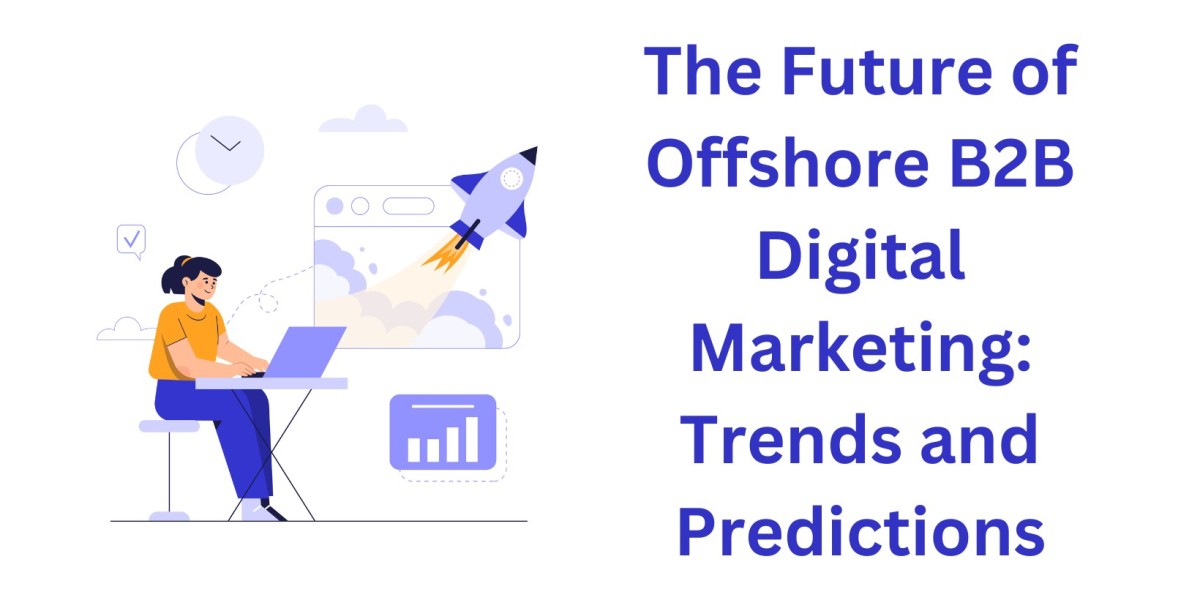Offshore B2B digital marketing is evolving rapidly as businesses seek innovative ways to stay competitive in a global marketplace. The landscape of digital marketing continues to change with new technologies, strategies, and market dynamics. Understanding the future trends and predictions in this field can help businesses make informed decisions and stay ahead of the curve. In this blog, we’ll explore what the future holds for offshore B2B digital marketing, examining key trends and predictions that are shaping the industry.
The Rise of Artificial Intelligence and Automation
Artificial Intelligence (AI) and automation are revolutionizing digital marketing, and this trend is set to continue in the future. These technologies are transforming how businesses approach their marketing strategies, offering new opportunities for efficiency and effectiveness.
AI-Driven Marketing Strategies
AI is becoming increasingly integral to digital marketing strategies. It enables businesses to analyze large volumes of data quickly, providing insights that were previously unattainable. AI tools can help in predicting customer behavior, personalizing content, and optimizing ad campaigns.
Enhanced Customer Personalization
One of the most significant benefits of AI in digital marketing is its ability to deliver highly personalized experiences. AI algorithms analyze customer data to tailor content and offers based on individual preferences and behaviors. This level of personalization can significantly enhance customer engagement and conversion rates.
Predictive Analytics
Predictive analytics powered by AI helps businesses anticipate future trends and customer needs. By analyzing historical data and identifying patterns, AI can predict which products or services customers are likely to be interested in. This foresight allows businesses to adjust their marketing strategies proactively.
Automation of Repetitive Tasks
Automation is another key trend that is transforming digital marketing. By automating repetitive tasks, businesses can improve efficiency and focus on more strategic activities. Automation tools handle tasks such as email marketing, social media posting, and ad management, allowing marketers to allocate their time more effectively.
Streamlined Campaign Management
Automation simplifies campaign management by scheduling and executing marketing activities without manual intervention. This streamlining ensures that campaigns run smoothly and consistently, reducing the risk of human error and freeing up resources for more complex tasks.
Improved Lead Nurturing
Automated lead nurturing processes help businesses engage with potential customers throughout their journey. Automated email sequences and personalized follow-ups ensure that leads receive relevant information at the right time, increasing the likelihood of conversion.
The Growth of Content Marketing
Content marketing remains a crucial component of digital marketing, and its importance is expected to grow in the future. High-quality, valuable content helps businesses attract and engage their target audience, building trust and authority in their industry.
Evolution of Content Formats
As digital media continues to evolve, so do the formats and types of content used in marketing strategies. Future trends suggest an increased focus on interactive and immersive content formats, such as videos, podcasts, and virtual reality (VR) experiences.
Interactive Content
Interactive content, such as quizzes, polls, and surveys, engages users in a more dynamic way. This type of content encourages active participation and provides valuable insights into customer preferences and behaviors.
Video Marketing
Video content is becoming increasingly popular, with more businesses leveraging its potential for engagement and storytelling. Future trends indicate that live video streaming and short-form video content will continue to gain traction, providing businesses with new opportunities to connect with their audience.
Emphasis on Value-Driven Content
In the future, content marketing will place a greater emphasis on delivering value to the audience. Businesses will focus on creating content that addresses specific pain points, answers questions, and provides actionable insights. This value-driven approach helps build trust and fosters long-term relationships with customers.
The Expansion of Multi-Channel Marketing
Multi-channel marketing is essential for reaching a diverse audience across various platforms. As digital marketing evolves, businesses will need to adopt a more integrated approach to manage their presence across multiple channels effectively.
Omnichannel Experience
The future of multi-channel marketing will involve creating a seamless omnichannel experience for customers. This approach ensures that users have a consistent and cohesive experience regardless of the platform or device they use. An integrated strategy helps maintain brand consistency and enhances customer satisfaction.
Coordinated Campaigns
Coordinating marketing efforts across multiple channels requires careful planning and execution. Businesses will increasingly focus on creating coordinated campaigns that align messaging and branding across different platforms, including social media, email, and search engines.
Data Integration
Integrating data from various channels is crucial for understanding customer behavior and optimizing marketing strategies. Future trends suggest a greater emphasis on data integration to provide a unified view of customer interactions and improve targeting and personalization.
The Role of Data Privacy and Security
As digital marketing becomes more data-driven, concerns about data privacy and security are growing. Businesses must navigate these concerns while continuing to leverage data for effective marketing.
Compliance with Data Regulations
Data privacy regulations, such as the General Data Protection Regulation (GDPR) and the California Consumer Privacy Act (CCPA), are becoming more stringent. Future trends indicate that businesses will need to prioritize compliance with these regulations to avoid legal issues and build trust with their customers.
Transparent Data Practices
Transparency in data collection and usage is essential for maintaining customer trust. Businesses will focus on clearly communicating their data practices and ensuring that customers are aware of how their information is used. This transparency helps build confidence and fosters positive relationships with customers.
Enhanced Security Measures
Protecting customer data from breaches and unauthorized access is a top priority for digital marketers. Future trends will see increased investment in cybersecurity measures to safeguard sensitive information and prevent data loss. Implementing robust security protocols ensures that customer data remains protected and secure.
The Evolution of SEO Strategies
Search Engine Optimization (SEO) is a fundamental aspect of digital marketing, and its strategies are continually evolving. Future trends in SEO will focus on adapting to changes in search engine algorithms and user behavior.
Voice Search Optimization
Voice search is becoming increasingly popular with the rise of smart speakers and voice-activated devices. Future SEO strategies will need to address the nuances of voice search, such as natural language processing and conversational keywords, to ensure that businesses remain visible in voice search results.
Conversational Keywords
Optimizing for conversational keywords involves targeting phrases and questions that users are likely to ask in voice search. This approach helps improve search visibility and provides more relevant results for users.
User Experience and Core Web Vitals
Search engines are placing greater emphasis on user experience and Core Web Vitals, which measure aspects such as page load speed, interactivity, and visual stability. Future SEO strategies will focus on enhancing user experience by optimizing website performance and ensuring that users have a positive browsing experience.
Conclusion
The future of offshore B2B digital marketing is shaped by emerging trends and evolving technologies. From the rise of AI and automation to the growth of content marketing and multi-channel strategies, businesses need to stay informed and adapt to these changes. Embracing these trends can help businesses leverage b2b offshore marketing services effectively and achieve their marketing goals. By understanding and implementing these future trends, companies can enhance their digital marketing efforts, stay competitive, and drive long-term success.








